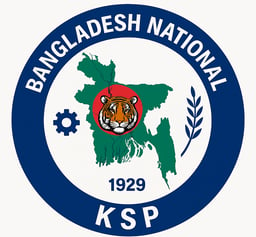Bangladesh National Krishak Sramik Party (BNKSP)
Bangladesh National Krishak Sramik Party - BNKSP is former KSP KRISHAK SRAMIK PARTY for the Bangladesh National Farmers and Workers Party (BNKSP), one of the oldest democratic parties in Bangladesh with a century-long history of advocating for farmers' and workers' rights.Empowering Farmers and Workers in Bangladesh.The Krishak Sramik Party (Bengali: কৃষক শ্রমিক পার্টি, Farmer Labourer Party) was a major anti-feudal political party in the British Indian province of Bengal and later in the Dominion of Pakistan's East Bengal and East Pakistan provinces. It was founded in 1929 as the Nikhil Banga Praja Samiti to represent the interests of tenant farmers in Bengal's landed gentry estates. Sir Abdur Rahim was its first leader. A. K. Fazlul Huq was elected leader in 1935 when the former was appointed as the president of the Central Legislative Assembly of India.
In 1936, it changed its name to Krishak Praja Party (Bengali: কৃষক প্রজা পার্টি Farmer Tenant Party) and contested the 1937 election. The party formed the first government in the Bengal Legislative Assembly. After the, it was reorganized as the Krishak Sramik Party (Farmer-Labour Party) to contest the 1954 election, as part of the United Front. The coalition won the election and formed the provincial government in the East Bengal Legislative Assembly.
The party's politics played an important role in the growth of Bengali Muslim political consciousness; it also received support from large sections of the Bengali Hindu population who resented the influence of the landed gentry.
The party was the political vehicle of the Bengali lawyer and politician A. K. Fazlul Huq,[1] who served as the Prime Minister of Bengal and Chief Minister of East Bengal. Another chief minister from the party was Abu Hussain Sarkar (1955–56). Abdus Sattar, one of the party's leaders, later became the President of Bangladesh.
Bangladesh National Krishak Sramik Party (BNKSP), a historic political organization with roots dating back to 1914. Founded by A.K. Fazlul Huq and recently reorganized under the leadership of Architect Shamsunnahar Begum, the BNKSP continues its century-long mission of advocating for farmers, laborers, and marginalized communities in Bangladesh. This constitution details the party's core principles, organizational structure, membership requirements, financial procedures, and disciplinary mechanisms, providing a framework for democratic governance and sustainable development initiatives.
Join the Bangladesh National Krishak Sramik Party today for a better future.
Historical Foundation and Evolution
The Bangladesh National Krishak Sramik Party (BNKSP) traces its origins to 1914 when it was first established as the "Krishak Praja Party" (KPP) by Sher-e-Bangla A.K. Fazlul Huq, who became known as the greatest champion for the liberation of farmers and laborers. For decades, the party has been dedicated to democratic principles while simultaneously committed to humanitarian service.
Fazlul Huq was a firm believer in coalition politics and development initiatives. Through the United Front coalition, he actively participated in nation-building efforts beginning in 1953. Following independence, the Krishak Sramik Party facilitated the re-establishment of the Juga Front (United Front) in 1999, with the late Advocate M.A. Latif Majumdar serving as president until March 8, 2015. After his tenure, Architect Shamsunnahar Begum assumed the presidency on March 18, 2015, and continues to implement new initiatives for the party's development and democratic evaluation.
The party first emerged in 1914 as the "Krishak Praja Party" (KPP). Later, in 1929, Sher-e-Bangla A.K. Fazlul Huq reorganized the party and relaunched it as the "Krishak Sramik Party" (KSP), with the primary objective of protecting the rights of farmers and laborers. Nearly a century later, on August 10, 2024, the Central Board unanimously changed the party's name to "Bangladesh National Krishak Sramik Party (BNKSP)," preserving its national scope while maintaining the historic "KSP" identity. Simultaneously, the party's logo was modernized.
150k+
Join Us
Get Involved
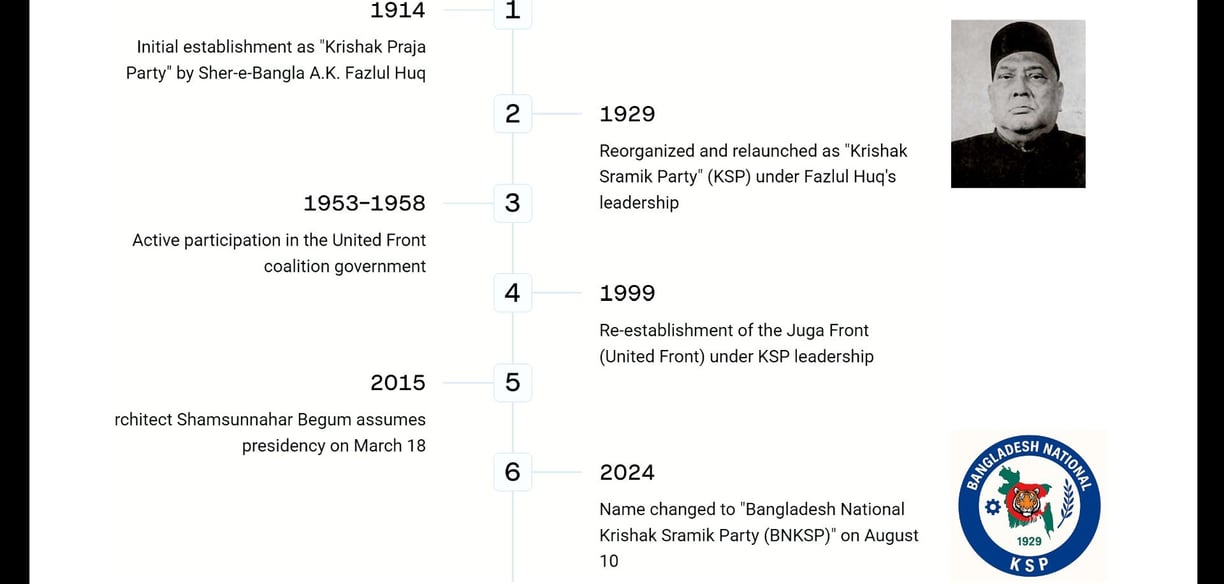

Party Leadership Line
The Bangladesh National Krishak Sramik Party has maintained a strong leadership tradition throughout its extensive history. The party's presidency has been held by distinguished individuals who have guided its evolution through various political eras and challenges in the South Asian subcontinent.
Sir Abdur Rahim (1929-1934)
As the inaugural president, Sir Abdur Rahim established the foundational principles of the party during British colonial rule. His leadership was instrumental in articulating the party's early vision for protecting tenant farmers against the zamindari system.
A.K. Fazlul Huq (1935-1955)
Known as Sher-e-Bangla (Lion of Bengal), Fazlul Huq transformed the party into a major political force. He served as Prime Minister of Bengal and Chief Minister of East Bengal, implementing significant reforms to relieve farmers' debts and champion the rights of agricultural workers.
Hamidul Huq Choudhury (1955-1968)
Leading through the challenging post-partition period, Choudhury maintained the party's relevance during East Pakistan's formative years and the military rule that followed.
A.S.M. Sulaiman (1969-1997)
Sulaiman guided the party through Bangladesh's independence and the subsequent political transitions, preserving its legacy during rapidly changing political landscapes.
M.A. Latif Majumdar (1997-2015)
During his extensive tenure, Majumdar led efforts to revitalize the party in modern Bangladesh, emphasizing coalition politics and democratic values.
Architect Shamsunnahar Begum (2015-Present)
As the current president, Shamsunnahar Begum has modernized the party structure, updated its name to BNKSP, and continues to champion the rights of farmers, laborers, and marginalized communities in contemporary Bangladesh.
This leadership continuity demonstrates the party's resilience and adaptability across nearly a century of South Asian political history, from British colonial rule through Pakistani governance to independent Bangladesh.
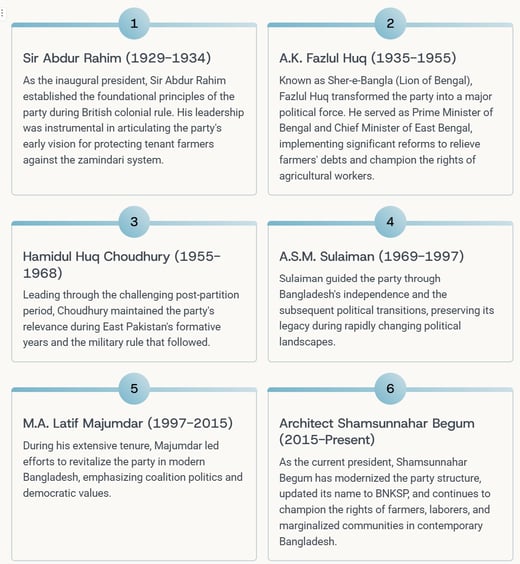

555+
15
Join Us Now
Our Mission
Presidents
Abdur Rahim (1929–1934)
A. K. Fazlul Huq (1935–1955)
Hamidul Huq Choudhury (1955–1968)
A.S.M. Sulaiman (1969–1997)
M. A. Latif Mazumder (1997–2015)
Architect Sumsun Nahar (2015-till)
Political Achievements in the Pre-Independence Era (1937-1947)
BNKSP is dedicated to promoting social justice, economic equality, and democratic governance through our core values and principles that guide our political actions and philosophy.
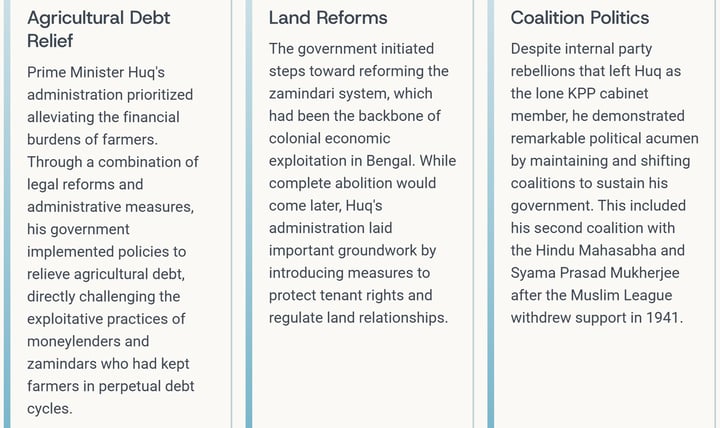

The 1937 provincial elections marked a watershed moment for the Krishak Praja Party. Despite being a relatively new political entity, the party secured 36 seats in the Bengal Legislative Assembly, demonstrating its growing appeal among the rural population. With the Congress boycotting the new system, A.K. Fazlul Huq claimed the right to form a government with support from the Muslim League, becoming the first Prime Minister of Bengal under provincial autonomy.
During this period, the party also participated in broader political developments affecting the Indian subcontinent. In 1940, Prime Minister Huq supported the Muslim League's Lahore Resolution, though his approach to communal issues remained more pragmatic than ideological. His willingness to join the Viceroy's defense council during World War II, against the wishes of Muslim League president Muhammad Ali Jinnah, illustrated his independent political stance.
These pre-independence achievements established the party's reputation as a champion of agricultural interests and demonstrated its ability to exercise political power effectively, despite operating in the complex and often tumultuous political landscape of late colonial India.
Transformation to Krishak Sramik Party (1947-1954)
This transformation set the stage for the party's participation in the landmark 1954 East Bengali legislative election as part of the United Front coalition. The expansion from "Krishak Praja Party" to "Krishak Sramik Party" represented not just a name change but an evolution in political vision to encompass the rights and interests of both agricultural and industrial workers in the changing socioeconomic landscape of East Pakistan.
Post-Partition Challenges
In the aftermath of partition, the party faced the challenge of redefining its identity and purpose in East Pakistan. The creation of Pakistan had resolved the immediate question of Hindu-Muslim political competition that had defined much of late colonial politics, but new tensions emerged between East and West Pakistan over language, resource allocation, and political representation.
This period saw relatively reduced political activity for the party as the Muslim League dominated the early years of Pakistan. However, A.K. Fazlul Huq continued to advocate for Bengali interests and maintained the party's grassroots connections during this relatively dormant phase.
In 1954, A.K. Fazlul Huq revived the party under a new name: Krishak Sramik Party (Farmer-Labor Party). This strategic rebranding reflected an expanded focus beyond just agricultural interests to explicitly include industrial workers. The addition of "Sramik" (Labor) to the party name signaled this broader constituency and positioned the party to address the emerging industrial economy of East Pakistan.
The rebranding came at a crucial moment in East Pakistani politics, as discontent with the Muslim League government was growing due to economic disparities, cultural marginalization, and political underrepresentation of Bengalis in the central government.
Revival and Rebranding
The partition of British India in 1947 fundamentally altered the political landscape of Bengal. The eastern regions became East Pakistan, creating new challenges and opportunities for political parties. During this transitional period, the party underwent significant reorganization to adapt to the post-colonial reality.
East Pakistani Politics and BNKSP (1955-1958)
Post- Challenges
The 1954 East Bengali legislative election stands as one of the most significant political events in the history of East Pakistan and in the development of Bengali nationalist consciousness. The Krishak Sramik Party joined forces with the Awami League and other opposition parties to form the United Front coalition, presenting a direct challenge to the ruling Muslim League.
The United Front campaigned on a comprehensive 21-point manifesto that addressed key issues, including:
Recognition of Bengali as a state language
Provincial autonomy for East Pakistan
Nationalization ofthe jute trade
Flood control and agricultural development
Release of political prisoners
Civil liberties and democratic rights
This platform resonated deeply with the Bengali population, who had grown disillusioned with the West Pakistan-dominated central government's policies
The election results were nothing short of revolutionary. The United Front secured a landslide victory, winning 223 out of 237 Muslim seats in the assembly. The Krishak Sramik Party itself won 48 seats, making it a major component of the victorious coalition. This overwhelming mandate represented a clear rejection of the Muslim League and a powerful assertion of Bengali political identity.
Revival and Rebranding
The period from 1955 to 1958 represented a tumultuous but significant phase in the party's history as it navigated the complex political landscape of East Pakistan. Following the dismissal of A.K. Fazlul Huq's government, East Pakistan underwent a period of Governor General's rule, reflecting the central government's reluctance to allow the United Front coalition to fully exercise its electoral mandate.
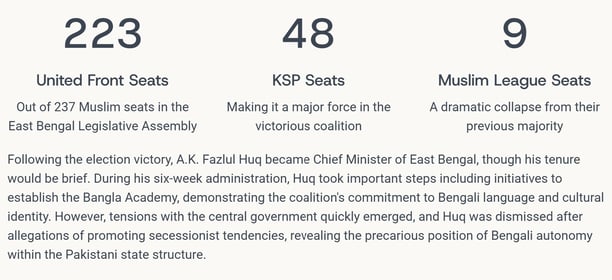

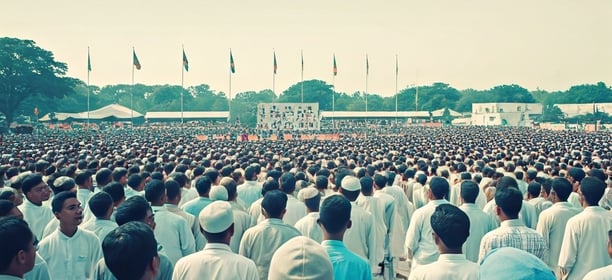

The United Front Victory of 1954
Post- Challenges
August 1955
A coalition between the Krishak Sramik Party in East Pakistan and the Muslim League in West Pakistan enabled Chaudhry Mohammad Ali to become Prime Minister of Pakistan. As part of this arrangement, A.K. Fazlul Huq was appointed as the federal Home Minister, giving the party representation at the central government level.
September 1955
Abu Hussain Sarkar, a prominent Krishak Sramik Party leader, became Chief Minister of East Pakistan. His administration worked to implement aspects of the United Front manifesto but faced constant challenges from both internal coalition dynamics and interference from the central government.
September 1956
The Sarkar government lost its majority in the provincial assembly, leading to the imposition of President's rule. This governmental instability reflected the deeper political tensions between East and West Pakistan and the difficulty of maintaining cohesive coalitions in the face of central government intervention.
1956-1958
The Krishak Sramik Party and Muslim League formed the main opposition to the Awami League and Republican Party coalition government. During this period, the party continued to advocate for greater provincial autonomy and farmers' rights despite being out of power.
This period demonstrated both the possibilities and limitations of democratic politics in Pakistan's early years. While the Krishak Sramik Party achieved significant electoral success and briefly held power at both provincial and federal levels, the persistent intervention of central authorities and the unstable nature of coalition politics prevented the full implementation of its agenda. The political experimentation of this era would come to an abrupt end with the 1958 military coup, which would fundamentally alter Pakistan's political trajectory.
The 1954 United Front victory refers to the overwhelming success of the United Front coalition in the East Bengal Legislative Assembly elections held in March 1954. The United Front, a coalition of various political parties opposed to the ruling Muslim League, secured a landslide victory, winning 223 out of 237 Muslim seats. This defeat marked a significant decline in the Muslim League's popularity in East Bengal, which would later become Bangladesh.
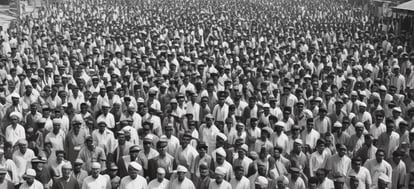

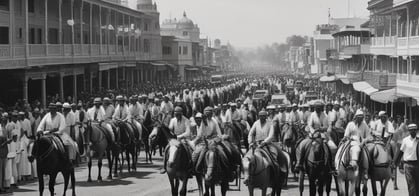

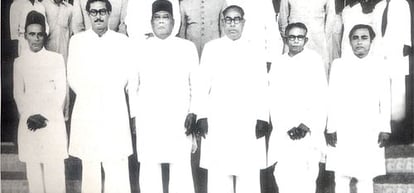

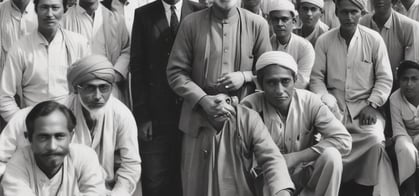

The Military Coup and Political Suppression (1958-1962)
Post- Challenges
All elected assemblies, including the East Pakistan Legislative Assembly where the Krishak Sramik Party had substantial representation, were dissolved
Political parties were officially banned, forcing the KSP to suspend formal operations
Numerous political figures, including A.K. Fazlul Huq, were placed under house arrest
The Elected Bodies Disqualification Order (EBDO) barred 75 politicians, many from East Pakistan, from holding public office for eight years
On October 7, 1958, Pakistan's democratic experiment was abruptly halted when President Iskander Mirza, with the support of General Ayub Khan, imposed martial law, dissolved all provincial assemblies, and banned political parties. This military coup had profound implications for the Krishak Sramik Party and the broader democratic movement in Pakistan.
The immediate aftermath of the coup saw a severe crackdown on political activity:
The military regime's suppression of political parties represented a severe setback for democratic development in Pakistan and particularly affected East Pakistani parties like the Krishak Sramik Party that had gained legitimacy through electoral success."
This period of political suppression severely constrained the KSP's ability to function as an organized political entity. The party's grassroots networks were disrupted, and its leadership was either detained or forced to curtail political activities. The military regime justified these measures as necessary to combat corruption and maintain national unity, but in practice, they disproportionately targeted East Pakistani political movements that advocated for regional autonomy.
The death of A.K. Fazlul Huq in 1962 marked the end of an era for the party. Having lost its charismatic founder and facing continued restrictions on political activity, the KSP struggled to maintain organizational cohesion during this period. Despite these challenges, the party's legacy and ideals continued to influence East Pakistani politics, particularly the growing movement for Bengali rights and autonomy that would eventually culminate in the Bangladesh liberation movement.
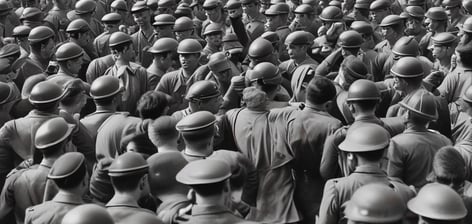

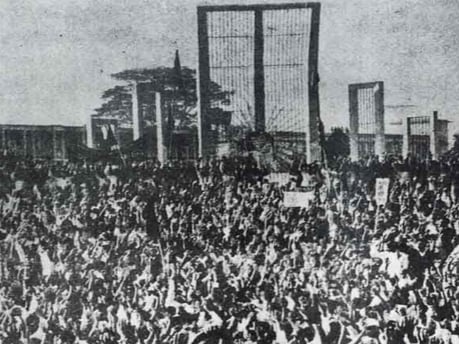

Leadership Transition and Reorganization (1962-1971)
Throughout this period, the KSP maintained its ideological commitment to agrarian reform and workers' rights, even as the broader political context shifted dramatically from struggles within the Pakistani state to the movement for an independent Bangladesh. The party's ability to survive organizational transitions and adapt to changing political circumstances demonstrated its resilience, though its influence had diminished compared to its heyday in the mid-1950s.
This transitional period laid the groundwork for the party's eventual adaptation to the political landscape of independent Bangladesh, where it would need to redefine its identity and purpose in a new national context.
Post-Partition Challenges
Leadership Succession
After Fazlul Huq's death, Hamidul Huq Choudhury assumed the presidency of the party from 1955 to 1968. As a seasoned politician who had served as Pakistan's Foreign Minister, Choudhury brought valuable experience but faced the challenge of operating under military rule's constraints.
Limited Political Space
Throughout the 1960s, the party operated in a restricted political environment. Ayub Khan's "Basic Democracy" system limited direct political participation, forcing the KSP to adapt its operational strategies and focus on maintaining its organizational networks rather than open political mobilization.
Sulaiman's Leadership
In 1969, A.S.M. Sulaiman became the party president, taking the helm at a critical juncture. The mass uprising against Ayub Khan's regime in 1969 had created new political opportunities, and Sulaiman worked to reposition the party in the rapidly evolving political landscape of East Pakistan.
Liberation War Period
As tensions between East and West Pakistan escalated in 1970-71, the party had to navigate the complex politics of the liberation movement. While individual members participated in the struggle for Bangladesh's independence, the party as an institution faced challenges in defining its role during this revolutionary period.
Following the death of A.K. Fazlul Huq in 1962, the Krishak Sramik Party entered a period of transition and reorganization under new leadership. Despite the continuing restrictions on political activities under Ayub Khan's martial law, the party maintained its organizational structure and ideological commitment to representing farmers and workers.
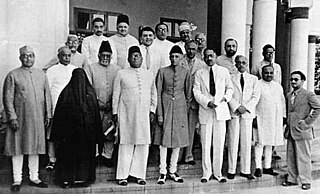

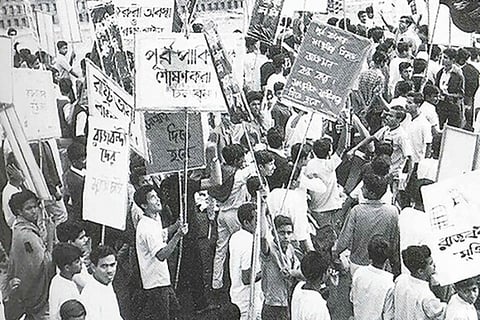

Post-Independence Era and Evolution (1971-1997)
This post-independence period demonstrated both the challenges and resilience of historical political parties like the KSP as they navigated the complex process of establishing their identity and relevance in the new nation of Bangladesh.
Post-Partition Challenges
Early Independence Period
Following Bangladesh's independence in 1971, the political landscape underwent a fundamental transformation. The Awami League, under Sheikh Mujibur Rahman's leadership, dominated the early years of the new nation. During this period, the Krishak Sramik Party worked to reestablish itself in the changed political environment.
The party's historical legacy as a champion of farmers' and workers' rights remained relevant in the newly independent Bangladesh, which faced enormous challenges of post-war reconstruction, poverty alleviation, and agricultural development. However, the KSP had to compete in a crowded political field where the liberation war credentials of the Awami League gave it significant political capital.
Political Participation in the Second Parliament
A significant milestone came in 1979 when the party participated in the second parliamentary elections in Bangladesh. Former KSP president A.S.M. Sulaiman contested the election with the "bicycle" symbol as part of the "Bangladesh Gono Front" coalition and won a seat in the National Parliament. This electoral success demonstrated the party's continuing relevance in Bangladesh's democratic system.
The election results showed that Sulaiman and the KSP received substantial voter support, securing approximately 12.47% of the total vote share in the constituencies where they fielded candidates. This electoral performance helped establish the party's credentials in independent Bangladesh's political system.
---------------------------------
Throughout the 1980s and early 1990s, the party continued to operate under A.S.M. Sulaiman's leadership until 1997. During this period, the KSP maintained its historical identity and organizational structure while adapting to Bangladesh's evolving political context. The party participated in various democratic movements against authoritarian rule and continued to advocate for its core constituencies of farmers and workers.
Post Liberation War Period
There was controversy regarding party registration during this period. According to party documents, although the KSP had secured parliamentary representation, the Election Commission in 2008 registered a party called "Gono Front" with the "fish" symbol instead of recognizing the KSP's historical claim to registration. This administrative decision created challenges for the party's formal status in the electoral system.
Following the death of A.K. Fazlul Huq in 1962, the Krishak Sramik Party entered a period of transition and reorganization under new leadership. Despite the continuing restrictions on political activities under Ayub Khan's martial law, the party maintained its organizational structure and ideological commitment to representing farmers and workers.
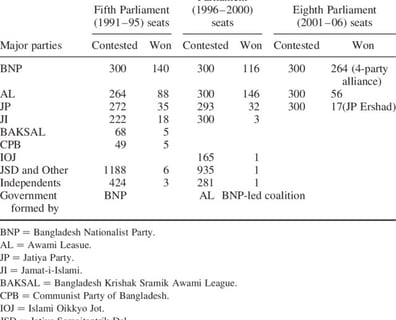

The recent decades have seen significant leadership transitions in the Bangladesh National Krishak Sramik Party, each marking a distinct phase in the party's contemporary development. These changes in leadership have coincided with efforts to modernize the party while maintaining its historical legacy and core principles.
Second parliamentary elections in Bangladesh. Former KSP president A.S.M. Sulaiman contested the election with the "bicycle" symbol as part of the "Bangladesh Gono Front" coalition and won a seat in the National Parliament.
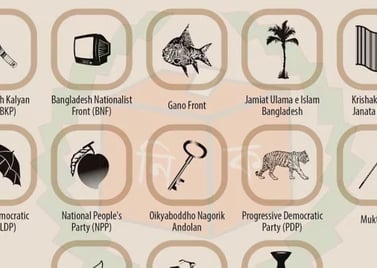

Modern Leadership Transitions (1997-Present)
Post- Challenges
1997: M.A. Latif Mazumder's Presidency
Following A.S.M. Sulaiman's long tenure, M.A. Latif Mazumder assumed the presidency of the party in 1997. Under his leadership, the party worked to strengthen its organizational structure and revitalize its presence in Bangladesh's increasingly competitive political landscape. Mazumder led initiatives to reestablish the party's historical connection to the Juga Front (United Front) tradition, emphasizing coalition-building as a core political strategy.
1999: Reestablishment of Juga Front
A significant milestone during Mazumder's leadership was the reestablishment of the Juga Front (United Front) in 1999. This initiative sought to recreate the successful coalition model that had delivered the historic 1954 election victory, adapting it to contemporary political conditions. The revival of this coalition approach reflected the party's continuing commitment to collaborative politics as a means of advancing its agenda.
March 18, 2015: Architect Shamsunnahar Begum's Leadership
Following Mazumder's presidency, which continued until March 8, 2015, Architect Shamsunnahar Begum assumed leadership of the party. As the current president, she has focused on modernizing the party while preserving its historical identity and principles. Under her leadership, the party has undertaken initiatives to adapt to Bangladesh's changing socioeconomic conditions and political environment.
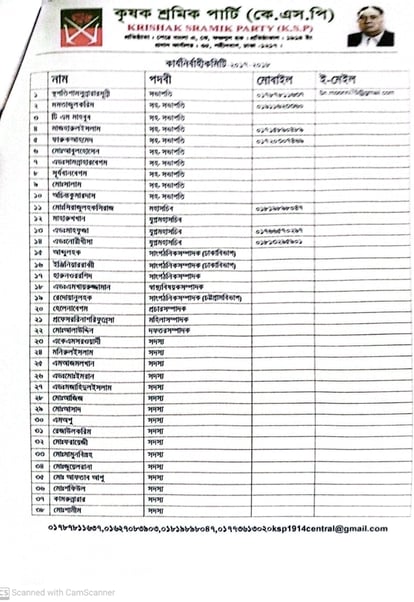

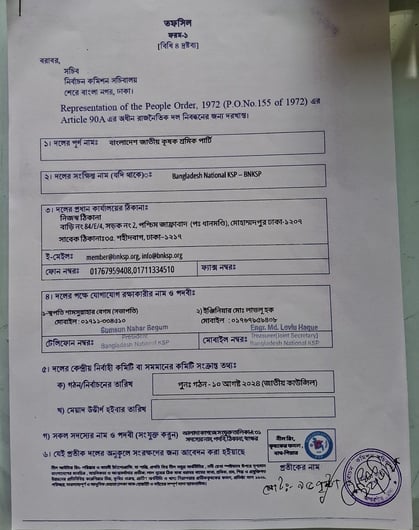

August 10, 2024: Name Change to BNKSP
A landmark decision came on August 10, 2024, when the Central Board unanimously agreed to change the party's name to "Bangladesh National Krishak Sramik Party (BNKSP)." This rebranding preserved the historical "KSP" identity while adding "Bangladesh National" to emphasize the party's national scope and commitment to representing farmers and workers across the country.
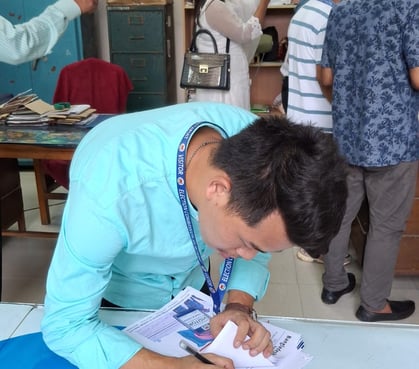

Core Ideological Principles
The Bangladesh National Krishak Sramik Party (BNKSP) is guided by a set of foundational ideological principles that inform its political positions, policy preferences, and organizational culture. These principles reflect both the party's historical roots and its adaptation to contemporary political realities.
Democracy
BNKSP is fundamentally committed to democratic governance at all levels - from internal party organization to national politics. The party advocates for transparent elections, civil liberties, political pluralism, and constitutional rule. This commitment stems from the party's historical experience with authoritarian regimes and its belief that genuine representation of farmers and workers is only possible within a democratic framework.
Agrarianism
As reflected in its name, the party places the interests of farmers (Krishak) at the center of its political vision. BNKSP advocates for land reform, agricultural modernization, fair prices for agricultural products, access to credit, and effective irrigation systems. The party views a prosperous agricultural sector as essential to Bangladesh's food security and economic development.
IT-Based Technological Reform
Recognizing the transformative potential of modern technology, BNKSP promotes the application of information technology to address social and economic challenges. The party advocates for technological solutions in education, healthcare, agriculture, and governance to enhance efficiency, reduce corruption, and promote inclusive development.
Egalitarian Society
BNKSP stands against all forms of discrimination based on class, religion, or background. The party works toward a society where all citizens have equal rights, opportunities, and dignity. This commitment to equality informs the party's approach to wealth distribution, access to public services, and social inclusion policies.
Anti-Feudalism
Continuing its historical opposition to the zamindari system, BNKSP remains committed to dismantling remaining feudal economic and social structures in Bangladesh. The party opposes concentration of land ownership, exploitative labor practices, and patron-client relationships that perpetuate economic inequality and social hierarchy.
Bengali Nationalism
BNKSP embraces Bengali cultural identity and linguistic heritage as central to Bangladesh's national character. The party supports policies that preserve and promote Bengali language, literature, arts, and cultural traditions while respecting the diversity within Bangladeshi society.
These core principles provide the ideological foundation for BNKSP's political program and organizational culture. They represent a synthesis of the party's historical legacy as a champion of farmers' and workers' rights with contemporary concerns about technological change, environmental sustainability, and social justice. By balancing tradition and innovation, BNKSP seeks to remain relevant to the evolving needs and aspirations of Bangladesh's population.
Empowering Bangladesh's Farmers and Workers
Welcome to the Bangladesh National Krishak Sramik Party, dedicated to advocating for the rights of farmers and laborers throughout our nation.


Fighting for farmer and laborer rights.
B.N.K.S.P.
"
Empowering Farmers Together
We support farmers' rights and promote sustainable agricultural practices for a better future.


Advocacy for Farmers
Championing the rights and welfare of farmers across Bangladesh through dedicated advocacy efforts.
Sustainable Agriculture Initiatives
Promoting eco-friendly farming techniques to enhance productivity and protect the environment.
Community Engagement Programs
Building strong community ties to support farmers and enhance agricultural development initiatives.


Gallery
Explore the vibrant moments of the Bangladesh National Krishak Sramik Party.









